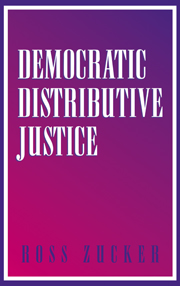Book contents
- Frontmatter
- Contents
- Acknowledgments
- 1 Democracy and Economic Justice
- Part I Unequal Property and Individualism in Liberal Theory
- Part II Egalitarian Property and Justice as Dueness
- Part III Egalitarian Property and the Ethics of Economic Community
- Part IV Democracy and Economic Justice
- Conclusions
- References
- Index
1 - Democracy and Economic Justice
Published online by Cambridge University Press: 02 December 2009
- Frontmatter
- Contents
- Acknowledgments
- 1 Democracy and Economic Justice
- Part I Unequal Property and Individualism in Liberal Theory
- Part II Egalitarian Property and Justice as Dueness
- Part III Egalitarian Property and the Ethics of Economic Community
- Part IV Democracy and Economic Justice
- Conclusions
- References
- Index
Summary
THE INTERSUBJECTIVE VIEW OF THE PERSON AND THE PRINCIPLE OF EQUALITY
Social aspects of the person should have a salience that they are not usually accorded in considerations of relative distribution. When their relation is adequately taken into account, economic justice can be seen to be different from that which is ordinarily posited. Conceptions of economic justice differ on the question of the relative distribution of income. But they do not sufficiently consider how some social aspects of the person might bear on the question. This book develops the view that these aspects of the person affect the degree of equality that is involved in the conception of economic justice.
A revised understanding of economic justice, derived from social premises, can then have implications for the nature of democracy. These implications are, however, often discounted in theories of democracy. For example, the “procedural” theory of democracy does not incorporate considerations of economic justice, because it views democracy and economic justice as separate concepts by defining democracy solely in terms of political equality. This book, by contrast, postulates an integral relation between democracy and economic justice that leads to the inclusion of principles of distributive justice within democratic rule. I develop a “substantive” theory, holding that the just distribution of economic resources is a defining characteristic of democratic rule. The theory cannot simply be synthesized with existing concepts of economic justice, because new principles for regulating the distribution of income and wealth are needed. These may be developed by revising the ethics of reward for economic contributions and the ethics of economic community.
- Type
- Chapter
- Information
- Democratic Distributive Justice , pp. 1 - 24Publisher: Cambridge University PressPrint publication year: 2000



